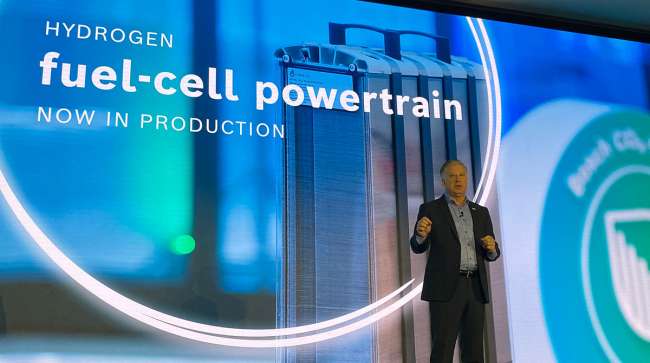Staff Reporter
Bosch Bets on Hydrogen for EV Trucking Future

[Stay on top of transportation news: Get TTNews in your inbox.]
LAS VEGAS — Bosch is broadening its strategy for hydrogen propulsion, adding plans for a hydrogen internal combustion engine to its current hydrogen fuel cell offering as it charts a path that views the fuel as central to a more sustainable future for trucking, company executives explained Jan. 8 during CES 2024.
“At Bosch, we’re convinced that hydrogen is one of the keys to decarbonizing our energy supply,” said Mike Mansuetti, president of North American operations. “As such, we’re investing heavily in hydrogen technologies and developing solutions along the hydrogen value chain.”
The German multinational engineering and technology company echoed a common sentiment among manufacturers and partners at the conference, with alternative fuels being a focus across vehicle types. The trucking sector is a major part of that discussion. Bosch sees a global increase in energy demand that is straining resources as a key challenge but doesn’t think decreasing energy demand is a viable solution. Therefore, it has embarked on a mission to develop alternative approaches that more efficiently utilize resources, such as a hydrogen fuel cell powertrain.
“A major thrust of our efforts is the hydrogen fuel cell powertrain, which we believe is the path to electrification for heavier vehicles,” Mansuetti said. “This week at CES, Nikola is offering rides in a truck powered by a Bosch fuel cell to experience this exciting new technology. In addition, we’re working on components for a hydrogen [internal combustion] engine that uses the fuel directly as opposed to first converting it to electricity.

“This technology can offer the performance of a diesel engine. On top of that, the climate benefit of the hydrogen engine increases even more when you use green hydrogen.”
Bosch plans to supply the hydrogen powertrain system as well as key components.
“It will be suitable for commercial vehicles in the on- and off-road segments, such as heavy-duty longhaul trucks and construction machinery,” Mansuetti said. “As a system provider for hydrogen engines, we’re currently developing solutions for both port and direct injection, and we plan to launch our first hydrogen engine later this year.”
The company started volume production of its fuel cell power module last summer in Stuttgart, Germany. It already has taken orders from truck makers in the U.S., Europe and China.
Welcome to #CES2024. The show is open! Follow us to see #tech in #AI, #mobility, #homecomfort, #homeappliances, #powertools, #sensors and much more from #BoschCES. More: https://t.co/lKTshkX8z4 pic.twitter.com/5rgwVngAXY — Bosch USA (@boschusa) January 9, 2024
“Around the globe, investment in hydrogen technologies is slowly picking up speed. In this regard, the U.S. is setting a great example.”
Mansuetti noted that the federal government is driving toward the buildup of a hydrogen infrastructure and has made $7 billion available for establishing hubs across the country. He noted that available funding has surpassed $50 billion when private investment sources are included.
“At Bosch, we’re committed to helping drive forward the clean-energy economy in North America,” Mansuetti said, “which is why we’re currently engaged with multiple hubs to identify projects where we can contribute our technological expertise in both the production and provisioning of hydrogen.”

Rückert
Bosch, too, is actively exploring local manufacturing to support the continued develop of hydrogen production. But also important to energy efficiency, as well as other expects of the business, is how the company has worked to utilize data. This involves a comprehensive use of software and digitalization across the business to optimize and create solutions.
“We are leveraging the power of data and algorithms to enhance comfort and convenience, as well as efficiency and sustainability,” Chief Data Officer Tanja Rückert said. “In the mobility domain, software is a key enabler of achieving the goals of future mobility that is more sustainable. We are so committed to this vision of mobility that we are realigning our entire mobility business to facilitate it. We are positioning ourselves more than ever as a software company for mobility and strengthening our cross divisional collaboration.”
Want more news? Listen to today's daily briefing below or go here for more info:




